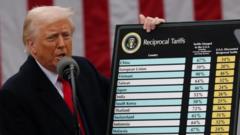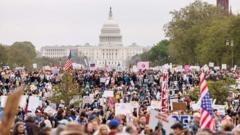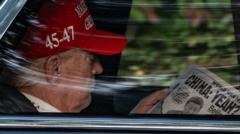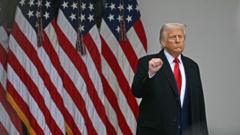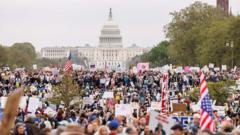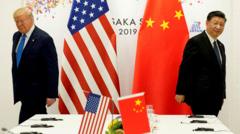Global leaders, including the EU and China, have spoken out against Trump's newly announced tariffs, warning they could lead to significant economic consequences for many nations.
World Leaders React to Trump’s New Tariffs: Global Backlash Intensifies

World Leaders React to Trump’s New Tariffs: Global Backlash Intensifies
The latest round of tariffs imposed by former President Trump has sparked strong condemnation from world leaders, signaling potential economic fallout.
The article text:
Former President Donald Trump's recent decision to impose a universal 10% tariff on all goods entering the United States has drawn sharp criticism from global leaders, with many describing the measure as a "major blow to the world economy." In particular, European Commission President Ursula von der Leyen has voiced her concerns, stating that the new tariffs will create "immense consequences" and urged unity among European nations to address the situation.
The tariffs, which will take effect on April 5, have incited opposition not only from European leaders but also from countries like China, which has warned of "resolute countermeasures" in response to the US actions. Trump justified the tariffs as necessary retaliation for what he perceives as unfair trade practices and emphasized their aim of revitalizing US manufacturing, claiming that such measures would ultimately "make America wealthy again."
Von der Leyen highlighted the potential for increased uncertainty in global markets, indicating dire consequences for vulnerable economies currently facing some of the highest tariffs. She pledged that Europe would present a unified front, with plans for countermeasures should negotiations with the US fail. "If you take on one of us, you take on all of us," she asserted, a sentiment echoed by government officials across Europe.
Leaders from various nations weighed in on the tariffs. Italy’s PM Giorgia Meloni, an ally of Trump, criticized the decision but advocated for negotiations to avert a trade war. Spain and Ireland's leaders also expressed their dissent, while French President Emmanuel Macron deemed the tariffs a "brutal and unfounded decision" that could impoverish both American and European consumers.
Countries outside the European sphere also voiced their apprehensions. China's response included a remarkable 34% tariff increase on US goods, significantly raising the stakes in the ongoing trade tensions. Taiwan and South Korea characterized the tariffs as "highly unreasonable" and an activation of a global trade war, respectively.
Additionally, Japan, Thailand, and Vietnam expressed regret and concern over their new tariffs, signaling that they would not accept these measures lightly. Each country has voiced intentions to engage in discussions and explore retaliatory actions to safeguard their interests.
The backlash also encompassed North American nations. While Canada was not directly mentioned in Trump’s announcement, it remains poised to face consequences, with Prime Minister Mark Carney noting the potential impact of automobile-related tariffs on millions of Canadians. He pledged to fight any tariffs with countermeasures to mitigate the effects on the Canadian economy.
As global leaders react to this fresh wave of tariffs, the air is thick with apprehension about the potential escalation of trade tensions. The situation remains fluid, with many countries beginning discussions for potential plans of action to confront these newly imposed tariffs.
Former President Donald Trump's recent decision to impose a universal 10% tariff on all goods entering the United States has drawn sharp criticism from global leaders, with many describing the measure as a "major blow to the world economy." In particular, European Commission President Ursula von der Leyen has voiced her concerns, stating that the new tariffs will create "immense consequences" and urged unity among European nations to address the situation.
The tariffs, which will take effect on April 5, have incited opposition not only from European leaders but also from countries like China, which has warned of "resolute countermeasures" in response to the US actions. Trump justified the tariffs as necessary retaliation for what he perceives as unfair trade practices and emphasized their aim of revitalizing US manufacturing, claiming that such measures would ultimately "make America wealthy again."
Von der Leyen highlighted the potential for increased uncertainty in global markets, indicating dire consequences for vulnerable economies currently facing some of the highest tariffs. She pledged that Europe would present a unified front, with plans for countermeasures should negotiations with the US fail. "If you take on one of us, you take on all of us," she asserted, a sentiment echoed by government officials across Europe.
Leaders from various nations weighed in on the tariffs. Italy’s PM Giorgia Meloni, an ally of Trump, criticized the decision but advocated for negotiations to avert a trade war. Spain and Ireland's leaders also expressed their dissent, while French President Emmanuel Macron deemed the tariffs a "brutal and unfounded decision" that could impoverish both American and European consumers.
Countries outside the European sphere also voiced their apprehensions. China's response included a remarkable 34% tariff increase on US goods, significantly raising the stakes in the ongoing trade tensions. Taiwan and South Korea characterized the tariffs as "highly unreasonable" and an activation of a global trade war, respectively.
Additionally, Japan, Thailand, and Vietnam expressed regret and concern over their new tariffs, signaling that they would not accept these measures lightly. Each country has voiced intentions to engage in discussions and explore retaliatory actions to safeguard their interests.
The backlash also encompassed North American nations. While Canada was not directly mentioned in Trump’s announcement, it remains poised to face consequences, with Prime Minister Mark Carney noting the potential impact of automobile-related tariffs on millions of Canadians. He pledged to fight any tariffs with countermeasures to mitigate the effects on the Canadian economy.
As global leaders react to this fresh wave of tariffs, the air is thick with apprehension about the potential escalation of trade tensions. The situation remains fluid, with many countries beginning discussions for potential plans of action to confront these newly imposed tariffs.

